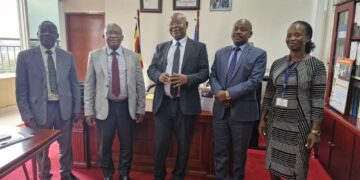Bugisu cultural leader has applauded Uganda Bureau of Statistics (UBOS) for the timely response in correcting the error about the population of the Bagisu in the National Housing and Population Census 2024 Results.
This was revealed during a courtesy call by a team representing His Royal Highness the Umukuuka, to the Census Commissioner, Dr. Chris Mukiza, at Statistics House in Kampala.
It was noted after the correction that the population of the Bagisu has increased by 448, 767 people in the last ten years. The Census 2014 Final Report puts Bagisu population at 1,647,382 people while the Census 2024 Provisional Results indicates 2,096,149 people.
The team used the opportunity to request for the separation of results of Bugisu and the Sebei Sub-regions, which have been bundled together and referred to as Elgon sub-region that is does not provide an accurate representation.
Masereje said that they would like to see Bugisu as a stand-alone statistical sub-region from Sebei sub-region, since these are two separate Sub-regions under Article 5 and Schedule 1 of the 1995 Constitution of Uganda.
Further, notwithstanding the fact that both sub-regions are located on the slopes of Mt Elgon, they have a lot of differences in the historical, social economic and geographical characteristics, which call for their independent presentation in the statistics.
According to UBOS statistical sub-regions, Sebei and Bugisu have always been referred to as Elgon sub-region, because of technical challenges related with dealing Sebei Sub-region that has a relatively much lower population. The other statistical sub-regions include; Acholi, Lango, Ankole, Bunyoro, Tooro, Buganda North, Buganda South, West Nile, Bukedi, Busoga, Kigezi, Teso, and Karamoja.
The representatives of the Umukuuka further noted that their proposal is timely as UBOS prepares to disseminate the National Population and Housing Census 2024 Final Results in December 2024 as per approved Census Roadmap.
The Legal brain said this will ably guide the planning, policy formulation and evidence-based decision-making for the people of Bugisu going forward. The delegation pledged their continuous support to the Bureau’s work whenever called upon.
Dr. Chris Mukiza was grateful to the Umukuuka for the collaboration and cooperation between the two institutions and most especially, the support rendered to the Bureau during the entire Census 2024 exercise.
He noted that all institutions of the Traditional or Cultural Leadership in Uganda are consumers of quality statistical data and information and, therefore, they form part of the Bureau’s stakeholders in the whole statistical value-chain.
“The Census 2024 data is robust and of high quality, it is time to make good use of this latest statistical data and information. In fact, your presence here at the Bureau is a testament of the importance that cultural leadership Institutions attach to statistical products, since one of the major mandates of the Traditional or Cultural leader under Sec 9(b) of the Institution of the Traditional or Cultural Leaders Act Cap 242 is to promote development for all the people who owe allegiance to him or her and that can only best be done when there are accurate statistics” he emphasized.
Counsel Richard Masereje was accompanied by Hon. Vincent Waboya.
According the Census 2024 findings, the total population of Uganda now stands at 45,904,417 people with the females taking a big share of 24,338,681 and males 21,566,736 persons. The population has grown by 11.3 million people between 2014 and 2024 with a population growth rate of 2.9%.
His Excellency Yoweri Kaguta Museveni, the President of the Republic of Uganda, has always agitated for a bigger population noting the benefits that come with it in relation to the socio-economic transformation of Uganda.











